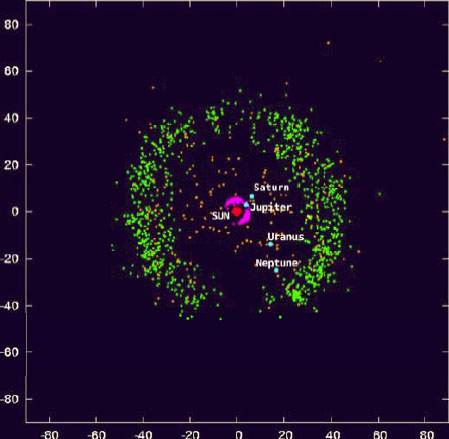The Solar System is a tough place to be a planet. Billions of years of being bombarded by millions of asteroids and comets and fried by the relentless radiation of the Sun makes it a miracle that the Earth could ever evolve into a planet bearing life. In the wake of all of this violence, the Sun was left with an orderly family of planets, or so astronomers thought until 1801.
During that era the Solar System had a mysterious large gap between the orbits of Mars and Jupiter that should have contained a planet. The search was on and on January 1, 1801 Giuseppe Piazzi discovered something that was moving in just the right area. It was confirmed to be a planet and was named Ceres, but even the best telescopes during that time could not resolve a disc. Ceres was a small world, but still retained its title as a planet. Nobody questioned it until several years later when several more planets were found in the same area between the orbits of Mars and Jupiter. Pallas, Juno, and Vesta increased the count to eleven planets; Neptune and Pluto were yet to be discovered. None of the new planets would resolve into a disc, but their status as planets remained intact.
Fifty years after the discovery of Ceres, these little worlds were starting to change the thinking of the structure of the Solar System as dozens of them were discovered residing between the orbits of Mars and Jupiter but none of them would reveal a disc. They appeared star-like and therefore all of these objects, including Ceres, were no longer called planets, but were re-classified as asteroids meaning “star-like”.
On February 18, 1930, an odd little world known as Pluto was discovered and christened the “Ninth Planet”. At first, Pluto was thought to be as large as Earth, but it broke all of the rules that the rest of the planets had set. It did not orbit close to the ecliptic, but instead orbited at an inclined angle of 17.1º. Worse yet it crossed the orbit of Neptune. No other planet did this. Pluto’s distance from the Sun varied around 2 billion miles! To top it off Pluto turned out to be tiny, only 1420 miles in diameter and smaller than the Earth’s Moon. Everyone considered Pluto a misfit planet, an enigma, and has even been called names such as the “Pipsqueak Planet”. Pluto received no respect as a planet!
 This was all to change again in 1992 when a small icy world was discovered far beyond Pluto. It was theorized during the 1950’s by a Dutch planetary scientist, Gerard Kuiper, that a belt of icy asteroids existed beyond Neptune, but technology was not good enough to find them until the 1990’s. Soon dozens of these small icy worlds were discovered and their numbers soared to nearly 1000 by 2007. This belt of new objects became known as the Kuiper Belt. Most of these icy worlds, known as Kuiperoids, have turned out to be very much like Pluto as they orbit far above and below the ecliptic plane and have highly elliptical orbits. Several cross the orbits of others. All but Eris, are smaller than Pluto, and several have moons like Pluto. The surface composition is also similar to Pluto with many of them having nitrogen and methane ice. Pluto did not look like a misfit anymore. A new question arose: should Pluto remain classified a planet? This was all to change again in 1992 when a small icy world was discovered far beyond Pluto. It was theorized during the 1950’s by a Dutch planetary scientist, Gerard Kuiper, that a belt of icy asteroids existed beyond Neptune, but technology was not good enough to find them until the 1990’s. Soon dozens of these small icy worlds were discovered and their numbers soared to nearly 1000 by 2007. This belt of new objects became known as the Kuiper Belt. Most of these icy worlds, known as Kuiperoids, have turned out to be very much like Pluto as they orbit far above and below the ecliptic plane and have highly elliptical orbits. Several cross the orbits of others. All but Eris, are smaller than Pluto, and several have moons like Pluto. The surface composition is also similar to Pluto with many of them having nitrogen and methane ice. Pluto did not look like a misfit anymore. A new question arose: should Pluto remain classified a planet?
It is human nature to place things in neat categories or “bins”. The Solar System we grew up with was made a bit untidy with Pluto disobeying the relative order and characteristics of the other eight planets. With rapid discoveries happening within the Kuiper Belt, the mind can now put everything in neat order: the Sun, the Inner Planets (Mercury, Venus, Earth, Mars), the Asteroid Belt, the Outer Planets (Jupiter, Saturn, Uranus, Neptune), and the Kuiper Belt, which includes Pluto. At last Pluto has a place in the Solar System. No longer should it be considered a true planet where it is considered a misfit or pipsqueak, nor should this be seen as a demotion. Instead it is a Kuiperoid of which it was the first of its kind to be discovered and therefore the original and the king. Now it has what it lacked ever since its discovery: respect. |

